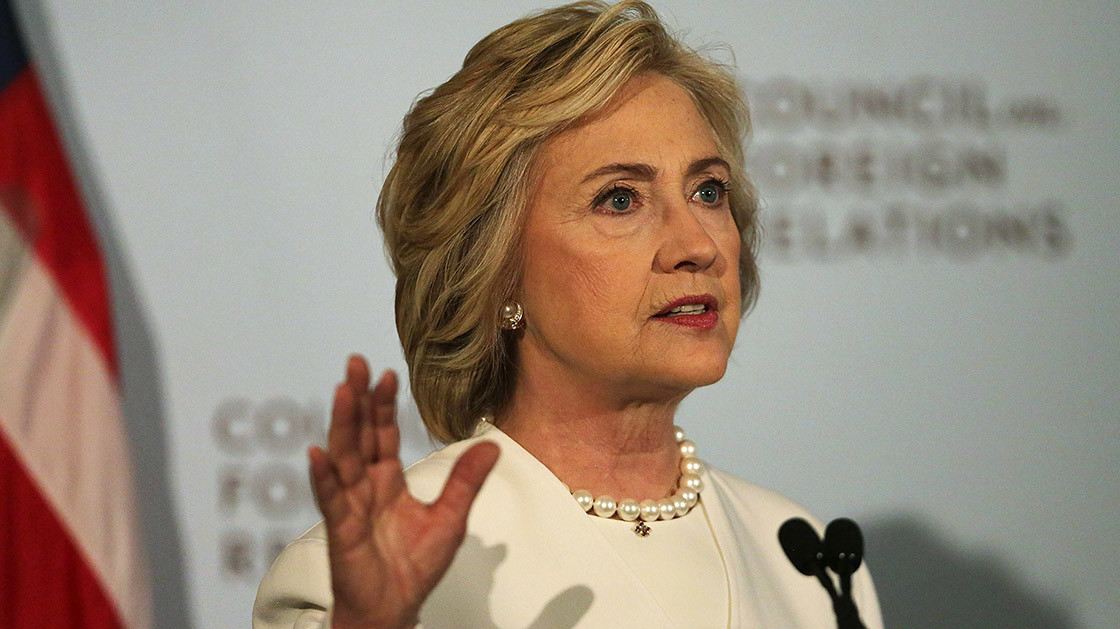
A federal judge has declined to speed up the release of a handful of emails from former Secretary of State Hillary Clinton's private account that refer to Anwar Al-Awlaki, the American militant killed by a U.S. drone strike in Yemen in 2011.
U.S. District Court Judge John Bates said he didn't think accelerating the release of the five emails would be highly disruptive to the monthly releases of thousands of Clinton emails scheduled to continue through late January, but said he worried taking the Awlaki-related messages out of that process could lead to more demands to pull out messages on other topics.
"I'm not going to jump the queue for this case," Bates said at the conclusion of a hearing in a lawsuit filed by the conservative group Judicial Watch in 2012. "I just don't think that would be warranted and it's a bad precedent for other judges in other cases to do the same."
Justice Department lawyer Stephen Elliott said a total of eight email messages about Al-Awlaki had been identified in the Clinton set: three already made public in monthly releases of Clinton's email ordered in another Freedom of Information Act case and five set to be disclosed in the coming batches.
"If the State Department expedites processing of individual documents in specific cases, it will just expand and extrapolate the burden on the State Department," Elliott said.
"That is sort of a parade of horribles," replied Bates, an appointee of President George W. Bush. The judge also said pulling a few documents out was unlikely to "wreak chaos" on the whole process.
Judicial Watch attorney Ramona Cotca noted that the group requested the Al-Awlaki documents from State and the FBI in 2011 and filed suit in 2012, while Clinton was still secretary of state. She said the group was "never informed" about Clinton's private account or any problem with searching her records until the news accounts emerged in March of this year, reporting she exclusively used a private server during her tenure as secretary and did not have a "state.gov" account.
"It's a pattern of failure to provide basic information that the Plaintiff is entitled to and that the court is entitled to," Cotca said.
Bates said it was regrettable that the dispute has dragged out. "I'm sorry it's a three-year-old case. I don't like to see old cases on my docket but we are where we are," he declared.
A search of the already-released Clinton messages shows three emails referencing Al-Awlaki: all consisted of or were based on news accounts. A November 2010 message relayed press reports in Yemen that Al-Awlaki had been indicted by local authorities. An October 2011 email contained an Associated Press story about the killing of Al-Awlaki's 16-year-old son Abdulrahman in a U.S. drone strike a couple of weeks before the father was killed in another strike. And a March 2012 message forwarded a Foreign Policy article about the State Department's efforts to use technology to subvert terrorists and autocrats.
The case also seeks Al-Awlaki-related emails from Clinton's top aides, including several who recently provided State with copies of emails held in private accounts. Elliott said the State Department had tallied up 15 such messages in the records of former Deputy Chief of Staff Huma Abedin, three in the records of former Policy Planning Director Jake Sullivan and 109 in the files of communications adviser Philippe Reines. No Al-Awlaki-related messages were found in the emails provided by Clinton Chief of Staff Cheryl Mills, the attorney said.
The responsive emails total about 5,700 pages, Elliott said, but most of those pages consist of lengthy compilations of press clippings.
The lawsuit is expected to continue into next year, with the next round of the legal fight expected to focus on whether State and the FBI adequately searched for documents and whether too much information was held back. The suit has produced hundreds of pages of FBI records showing in-depth surveillance of Al-Awlaki after the September 11, 2001 attacks, when he was serving as imam at a mosque in Falls Church, Va.
The records showed the FBI trailed Al-Awlaki as he visited prostitutes, ate at Bertucci's and took part in a radio interview with NPR. The documents indicate that agents, who suspected he was involved in terrorism, had him under surveillance when he visited the Pentagon in February 2002 to speak to top Defense Department officials about religious tolerance.
Later in 2002, Al-Awlaki became aware of the FBI's surveillance of him and left the United States for the United Kingdom, eventually making his way to Yemen. There, he became one of the best known, English-language voices of radical Islam and was crediting with inspiring many recruits for al Qaeda in the Arabian Peninsula. He was killed in a drone strike in northern Yemen on September 30, 2011.
- Publish my comments...
- 0 Comments
